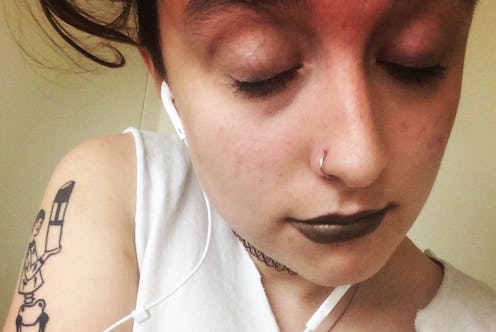Fashion
How My Love Of Lipstick Affects My Queerness

My love affair with lipstick started about two years ago during my freshman year of college, when I received a small sample-size Shiseido lipstick in a deep red shade. (Little did I know this would start a fascinating relationship between my lipstick and sexuality.) The Shiseido came with my online order from Sephora, containing my skincare basics at the time. As soon as I tried it on, I was obsessed. I had never considered lipstick to be part of my makeup regimen, because I could only use products for sensitive skin. And besides, my mother — the source of all of my early beauty knowledge — rarely ever used lip color in her own beauty routine.
I began to ask myself several questions about the role that makeup could potentially play in my life, since I always tended to avoid anything considered “girly.” But the more I experimented with cosmetics, especially lipstick, the more I realized that this romance could not remain unrequited. I began collecting lipstick and started finding the products that worked best for me. After discovering the power of purple lip color in a MAC tube, I took a leap and started buying and wearing lipstick in every color of the rainbow. As soon as I began to embrace brighter colors and bolder ways of expressing beauty, I was able to embrace my queer identity more fully. But not without certain complications.
In the queer community, visibility is of the utmost importance. People belonging to marginalized identities are chronically invisible in the eyes of society, as they are constantly invalidated and silenced. Therefore, people turn to fashion and beauty to express their queerness, both for personal and political reasons.
“Looking queer” often implies short hair, crazy-colored makeup and hair, and body modifications such as tattoos and piercings. By these standards, I began college not looking queer enough, and feeling a bit isolated from the community as a whole. Over the years, however, I’ve gradually cut my hair shorter, accumulated more and more tattoos, pierced my nose, and starting wearing lipstick in bold shades on the daily.
But for the first time in my life, I have allowed myself to present my self exactly the way I want to and in exactly the way I feel comfortable with. I no longer feel self-conscious about my appearance and beauty preferences that aren’t necessarily “feminine,” because I’m surrounded by people who feel the same way. "Looking queer" not only makes me feel like me, but it shoves my identity in the faces of others, which makes my identity feel valid and important.
That being said, not every queer person fits the stereotype of “looking queer,” nor should they have to. People expressing any traditional expression of gender — like women who wear their hair long — are often written off by the queer community, stripping their queer identity of its validity. By not employing this look and bringing attention to your queerness in the conventional ways I mentioned above, you become practically invisible within the community itself.
This became clear as day to me once I cut my hair short. When I walked into class with my new look, the praise I got from my queer acquaintances, and every interaction since then, suddenly gave me the nice but peculiar reassurance that I finally exist in their eyes. It undeniably felt good, especially since the haircut made me feel so wonderful. But it began to bother me that I had not seemed worth their time before, and perhaps was written off as “not being queer enough.” Not only is it wrong to assume that someone’s gender expression is equivalent to their gender identity, but it’s also not fair to expect all queers to be so comfortable with visibility.
Adopting crazy lipstick colors also earned me a lot of praise. But I can’t help but wonder if the change in people’s perception of me paralleled the fact that I was feeling more confident than I ever had before. This definitely contributes to people’s reaction in some way, because lipstick does in fact make me feel absolutely invincible. When I’m feeling anxious or insecure, lipstick is the crutch that keeps me going and reminds me that I’m a real person who deserves to be seen and valued.
Regardless of the perceptions of others, I am comfortable with visibility through my expression and beauty routine because I’m doing it for me, to be my most authentic self. I don’t wear makeup to be feminine or gain acceptance from our heteronormative society. And I don’t wear crazy-colored lipstick because I am trying to look queer. I do what I do and wear what I wear because it makes me feel good, and makes the truest version of myself visible to my own eyes and in the eyes of those who love me most.
My identity is fluid, beautiful, and wholly mine, and it deserves to be seen. And my beauty routine is not always an act of protest or conformity — rather, it’s often rooted in the fact that I love lipstick and its many healing powers.
Images: Author's Own; Giphy